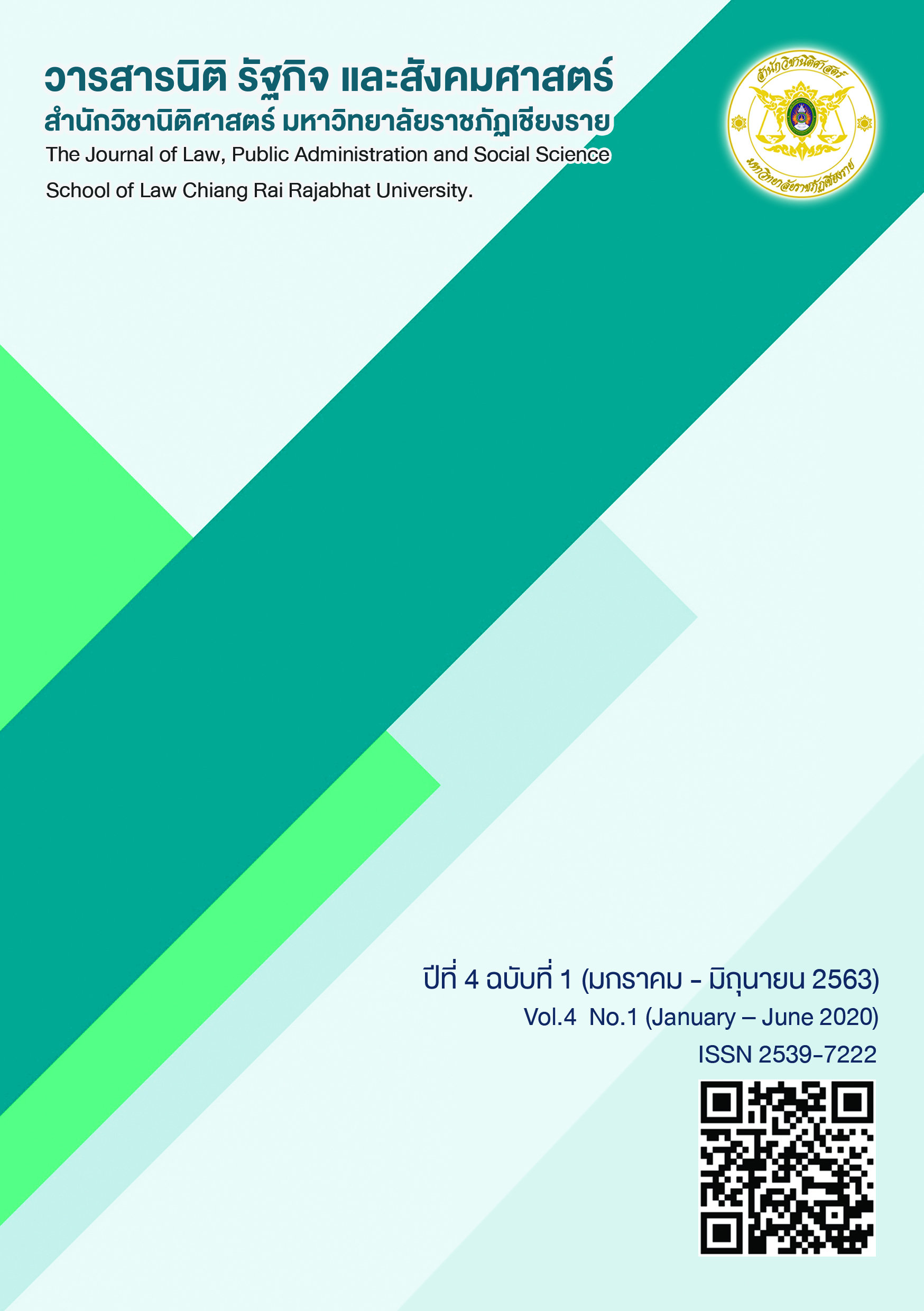Thai Legal Measures against Drug Addiction
Main Article Content
Abstract
Reducing the number of drug users is an important factor in the prevention and suppression of drug-related offenses by the state. Solving the problems of drug users in Thailand According to the narcotics law, drug addicts are still offenders with criminal penalties. But there are treatment, measures,Treatment according to the principle that drug users are patients In three characteristics. 1.compulsory treatment according to the law for drug addicts rehabilitation, 2.voluntary therapy and 3.convict treatment Found that there are still obstacles, problems and unable to treat drug addicts Causing repeated offenses and drug users are eventually sent to criminal penalties. Guidelines for solving drug problems in foreign countries. It is based on the idea that drug users are not criminals, but are patients that require treatment, rehabilitation as well. But has separated the addicts that are not serious or that are dangerous to society from being a criminal offender absolutely. To rehabilitate the addicts until they have ceased being addicted to drugs. Without time limits. There is a change in the method of treatment and rehabilitation plan according to the circumstances. No criminal charges were brought back. This approach should be studied and adopted to resolve legal measures for rehabilitation of drug addicts in Thailand. In order to solve the problems of drug users effectively.
Article Details
References
กรมคุมประพฤติ. (2562). รายงานผลการฟื้นฟูฯที่เสนอต่อคณะอนุกรรมการฟื้นฟูฯ ของสำนักงานคุมประพฤติทั่วประเทศ ปีงบประมาณ พ.ศ. 2546 – 2562. สืบค้นวันที่ 6 พฤศจิกายน 2562, จาก http://164.115.41.115/doc_dop/
กรมราชทัณฑ์. (2561). สถิติผู้ต้องขังที่กระทำผิดต่อพระราชบัญญัติยาเสพติด. ศูนย์เทคโนโลยีสารสนเทศกรมราชทัณฑ์. สืบค้นวันที่ 4 พฤศจิกายน 2562, จาก http://www.correct.go.th/stat102/display/drug_select_date_ user.php
กรมราชทัณฑ์. (2562). อัตราการกระทำผิดซ้ำแยกตามกลุ่ม. สืบค้นวันที่ 4 พฤศจิกายน 2562, จาก http://www.correct.go.th/recstats/index.php/th/searchGroup
กระทรวงยุติธรรม. (2543). เอกสารประกอบการสัมมนา โครงการเวทีความคิดเพื่อการพัฒนากระบวนการยุติธรรมไทย เรื่อง วิกฤตยุติธรรมที่ต้องแก้ไข.
กิตติพงษ์ กิตติยารักษ์. (2559). โปรตุเกสโมเดล: กรณีศึกษาสำหรับนโยบาย ยาเสพติดไทย. สืบค้นวันที่ 10 ตุลาคม 2562, จาก https://bit.ly/2Hc4zF7
คณะกรรมาธิการสากลว่าด้วยนโยบายยาเสพติด. (2016). รายงานการขับเคลื่อนการปฏิรูปนโยบายยาเสพติด: แนวทางใหม่สู่การลดทอนความเป็นอาชญากรรมทางคดีอาญา. สืบค้นวันที่ 12 ตุลาคม 2562, จาก https://bit.ly/2nvun5m
จิรภัทร ลิ้มอักษร. (2562). โปรตุเกสแก้ปัญหายาเสพติดในมุมมองใหม่จบวิกฤตยาเสพติด 40ปี. สืบค้นวันที่ 9 กันยายน 2561, จาก https://highlandnetwork.asia
นิยม เติมศรีสุข. (2561). บทสัมภาษณ์เลขาธิการ ป.ป.ส. เรื่อง การบำบัดรักษายาเสพติดตามนโยบาย “ผู้เสพ คือ ผู้ป่วย”.
สืบค้นวันที่ 4 กันยายน 2561, จาก https://www.moj.go.th/view/17646
ประสาร มหาลี้ตระกูล. (2561). บทสัมภาษณ์อธิบดีกรมคุมประพฤติ. ในประเด็น “กฎหมายคุมประพฤติ แก้ปัญหานักโทษล้นคุก.
สืบค้นวันที่ 1 กันยายน 2561, จาก https://www.moj.go.th/view/133831.
สำนักงานตำรวจแห่งชาติ. (2562). ระบบสารสนเทศสถานีตำรวจ. ศูนย์เทคโนโลยีสารสนเทศ สำนักงานตำรวจแห่งชาติ.
สืบค้นวันที่ 9 กันยายน 2561, จาก http://pitc.police.go.th/2014
เฮเลน เรดมอนด์ .(2555). การทำให้ยาเสพติดไม่ผิดกฎหมายเป็นนโยบายที่ประสบความสำเร็จในโปรตุเกส แต่มาตรการรัดเข็มขัดอาจเป็นอุปสรรคต่อการรักษาผู้ติดยา. สำนักงานส่งเสริมสังคม แห่งการเรียนรู้และคุณภาพเยาวชน. สืบค้นวันที่ 30 ตุลาคม 2562, จาก http://www.qlf.or.th/Home/Details?contentId=255


